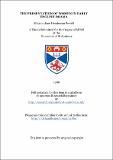Files in this item
The presentation of women in early English drama
Item metadata
| dc.contributor.author | Powell, Melanie Jane Henderson | |
| dc.coverage.spatial | v, 567 p. | en_US |
| dc.date.accessioned | 2018-07-03T15:32:21Z | |
| dc.date.available | 2018-07-03T15:32:21Z | |
| dc.date.issued | 1988 | |
| dc.identifier.uri | https://hdl.handle.net/10023/14864 | |
| dc.description.abstract | This study is a survey of the presentation of women in English drama from 1300 - 1600, and of the relationship between stage views and contemporary attitudes to women during this period. Its purpose is twofold. It sets out to investigate whether the questioning of current ideas about women which has been well documented in the drama of Shakespeare and his contemporaries was also a feature of earlier drama. It also examines whether the account put forward by Lawrence Stone, in The Family, Sex and Marriage in England 1500 - 1800, of the way in which major social changes at the time of the Reformation affected the status of marriage and of women is substantiated by evidence -from contemporary drama. Research for the study has been carried out mainly through reading or more detailed analysis of most of the 300 surviving plays from the period, with reference to relevant secondary sources of literary criticism and social history. The work is presented in four chapters. Chapter 1 considers attitudes to women in the life and drama of the Pre-Reformation period. After an Introduction summarising views of women in mediaeval religious, legal and economic life, it examines the way in which women were presented in the Mystery and Morality plays. Finally, it considers in detail the few but significant interludes produced by dramatists of the Thomas More circle shortly before the Reformation. Chapter 2 examines what I have called the Testing Plays: the wave of didactic plays which promoted the new Protestant ideal of the obedient wife. They demonstrated how young women should be educated for wifehood, and the way in which the virtues of the perfect wife should withstand stringent testing. The chapter begins with a summary of the importance of the education element in the plays. It then examines the earlier type of Testing Play, in which the husband torments his wife in order to test her constancy, before moving to the later plays concerned with the test of chastity, in which a woman or couple is threatened by the desire of a powerful social superior. Chapter 3 examines drama's response to the contemporary debate on the correct reasons for marriage. It starts with a study of the artistic influences of romance and classical comedy which enabled dramatic treatment of the topic, before moving to a detailed study of the way in which the plays reflected and explored the whole spectrum of opinion. Chapter 4 considers the presentation of women in tragedy throughout the period. It examines the limiting influences inherited from classical tragedy and the extent to which they continued to dominate later tragedy. Finally, it looks in detail at three plays which offer an early indication of the genre's potential eventually to produce exciting heroines.The study concludes that discussion and questioning of current attitudes to women has been an important feature of English drama from its earliest origins. The particularly close relationship between society and drama is demonstrated by the exactness with which contemporary drama reflects Lawrence Stone's account of social changes during the period of the study. However, while Shakespeare's predecessors and contemporaries undoubtedly questioned and investigated current views about women, no-one else seems to have transcended them and shown the insight that he did. The reasons for the uniqueness of his vision remain as difficult to identify as ever. | en_US |
| dc.language.iso | en | en_US |
| dc.publisher | University of St Andrews | |
| dc.subject.lcc | PR658.W7P7 | |
| dc.subject.lcsh | English drama--Early modern and Elizabethan, 1500-1600--History and criticism | en |
| dc.subject.lcsh | Women in literature | en |
| dc.title | The presentation of women in early English drama | en_US |
| dc.type | Thesis | en_US |
| dc.type.qualificationlevel | Masters | en_US |
| dc.type.qualificationname | MPhil Master of Philosophy | en_US |
| dc.publisher.institution | The University of St Andrews | en_US |
This item appears in the following Collection(s)
Items in the St Andrews Research Repository are protected by copyright, with all rights reserved, unless otherwise indicated.

